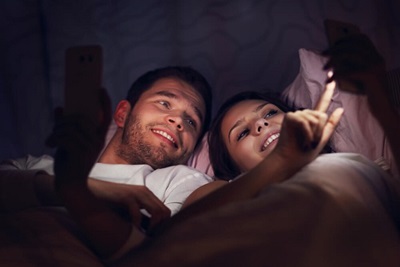Tech to Avoid Before Bed
 Do you have trouble drifting off to sleep? The familiar glow of your electronic device (or devices) might be the culprit. If your bedtime routine includes your cellphone, laptop or tablet, they could be keeping you from sweet slumber.
Do you have trouble drifting off to sleep? The familiar glow of your electronic device (or devices) might be the culprit. If your bedtime routine includes your cellphone, laptop or tablet, they could be keeping you from sweet slumber.
The National Sleep Foundation notes that 90 percent of Americans confessed to using one of those devices at least an hour before hitting the sack, and it says these gadgets are stimulating you psychologically and physiologically in the following ways:
- Keeping your brain alert: Tweeting, emailing or just web surfing before going to bed can keep your brain active and make it difficult to relax and sleep. Your devices also can delay the onset and decrease your total amount of REM sleep.
- Suppressing melatonin: The screens of your gadgets (including your TV) emit blue light that hinders your production of melatonin, the hormone controlling your circadian rhythm, or sleep-wake cycle. Falling and staying asleep is tougher with less melatonin.
- Waking you up: If you keep your cell phone on your nightstand within easy reach, you could be awakened whenever it buzzes or chimes from an incoming text, email or call during the night.
The Sleep Foundation suggests that you increase your chances of getting a good night’s sleep with a transition time. At least a half hour before bedtime, stop using your cell phone, tablet or laptop.
The American Association of Sleep Technologists recommends that you set your phone to silent mode instead of vibrate – or don’t bring it in your bedroom. If you use your device as your alarm clock, the organization suggests you use a nightstand clock.
Your phone and tablet can be set to diminish blue light during certain times of the day. In Apple devices, under Display and Brightness, set your nighttime mode to help diminish blue light during the hours you should be sleeping. For Android users, under Display, filter out your blue light when using your devices close to bedtime.
If you have persistent sleep problems, BayCare offers advanced diagnostic sleep testing at Sleep Disorders Centers around Tampa Bay.
